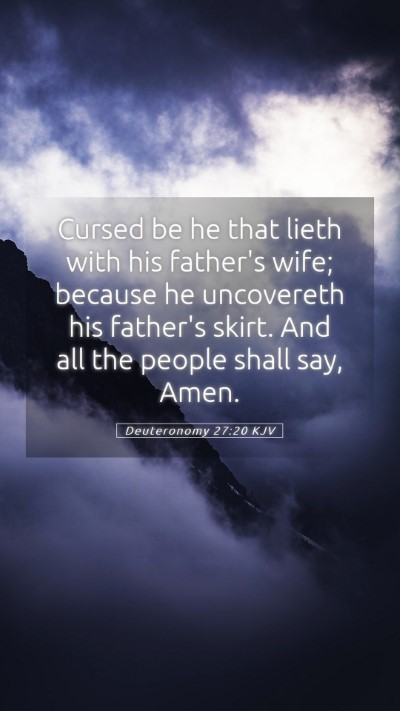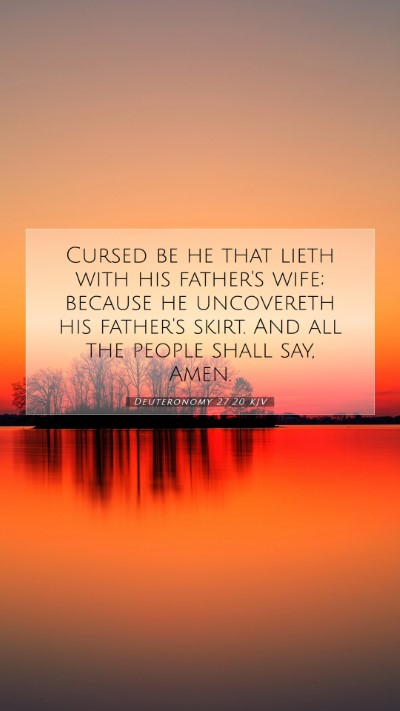Understanding Deuteronomy 27:20
Verse: "Cursed be he that lieth with his father's wife; because he uncovereth his father's skirt. And all the people shall say, Amen."
This verse from Deuteronomy 27:20 is part of a larger passage that outlines the curses for disobedience to God's law. It serves to instruct the Israelites on the seriousness of sexual morality and the sanctity of family relationships. Here we explore the meaning of this verse through various public domain commentaries including insights from Matthew Henry, Albert Barnes, and Adam Clarke.
Bible Verse Commentary
The essence of Deuteronomy 27:20 revolves around the warning against incestuous relationships, particularly focusing on the gravity of a man lying with his father's wife. The curse pronounced here reflects the severity of violating such moral codes.
Insights from Matthew Henry
Matthew Henry emphasizes the moral depravity represented by the act mentioned in this verse. He states that such an act not only dishonors a father but also shows a deep disregard for the fabric of family. He highlights that the repercussions are seen as a curse, illustrating how seriously such sins are viewed in the eyes of God. This also serves as a societal warning, promoting the sanctity and holiness of family relationships.
Insights from Albert Barnes
Albert Barnes provides a detailed exegesis by contextualizing the law within ancient Israelite society. He notes the cultural implications of this commandment; it served to preserve family honor and moral ethics. Barnes points out that the cursing is not just a matter of punishment but also of communal affirmation - indicating that the people themselves acknowledge the justice of this law. The term "Amen" signifies their agreement, reinforcing the gravity of these commands among the community.
Insights from Adam Clarke
Adam Clarke explores the historical background of the verse, noting that such practices were prevalent in some neighboring cultures. He interprets the verse as a strong prohibition against a common sin of the time, aiming to distinguish the Israelites from surrounding nations. Clarke emphasizes that God's intention is to set a standard of moral conduct that protects family integrity and societal order.
Application of the Verse
In applying Deuteronomy 27:20 to modern life, it serves as a reminder of the importance of family ethics and sexual morality. The verse stresses that actions against family members are not just personal sins but offenses against God’s commandments. It encourages believers to seek purity in relationships, affirming the principle that maintaining integrity within the family unit is crucial for a righteous life.
Bible Study Insights
- Significance of Curses: Understanding the concept of curses in the Old Testament provides insight into how seriously the Israelites viewed sin and its consequences.
- The Principle of Accountability: The collective response of “Amen” teaches about community accountability in upholding moral standards.
- Sacredness of Family: This passage urges a reflection on the sacredness of family bonds and the need for respect within those relationships.
Cross References
- Leviticus 18:8: "The nakedness of thy father's wife shalt thou not uncover: it is thy father's nakedness."
- 1 Corinthians 5:1: "It is reported commonly that there is fornication among you, and such fornication as is not so much as named among the Gentiles, that one should have his father's wife."
- Ephesians 5:3: "But fornication, and all uncleanness, or covetousness, let it not be once named among you, as becometh saints."
Conclusion
Understanding Deuteronomy 27:20 enriches our comprehension of Scripture and its applications. This verse, emphasizing the seriousness of moral behavior, resonates throughout biblical teachings concerning family and ethics. Through the examination of public domain commentaries like those of Matthew Henry, Albert Barnes, and Adam Clarke, we gain deeper insights into the text, aiding us in our Bible study endeavors.
For anyone engaging in Bible study groups, considering online Bible study, or utilizing Bible study tools, this analysis serves as an essential resource to fully grasp the implications of biblical commandments and their relevance in both historical and contemporary contexts.


